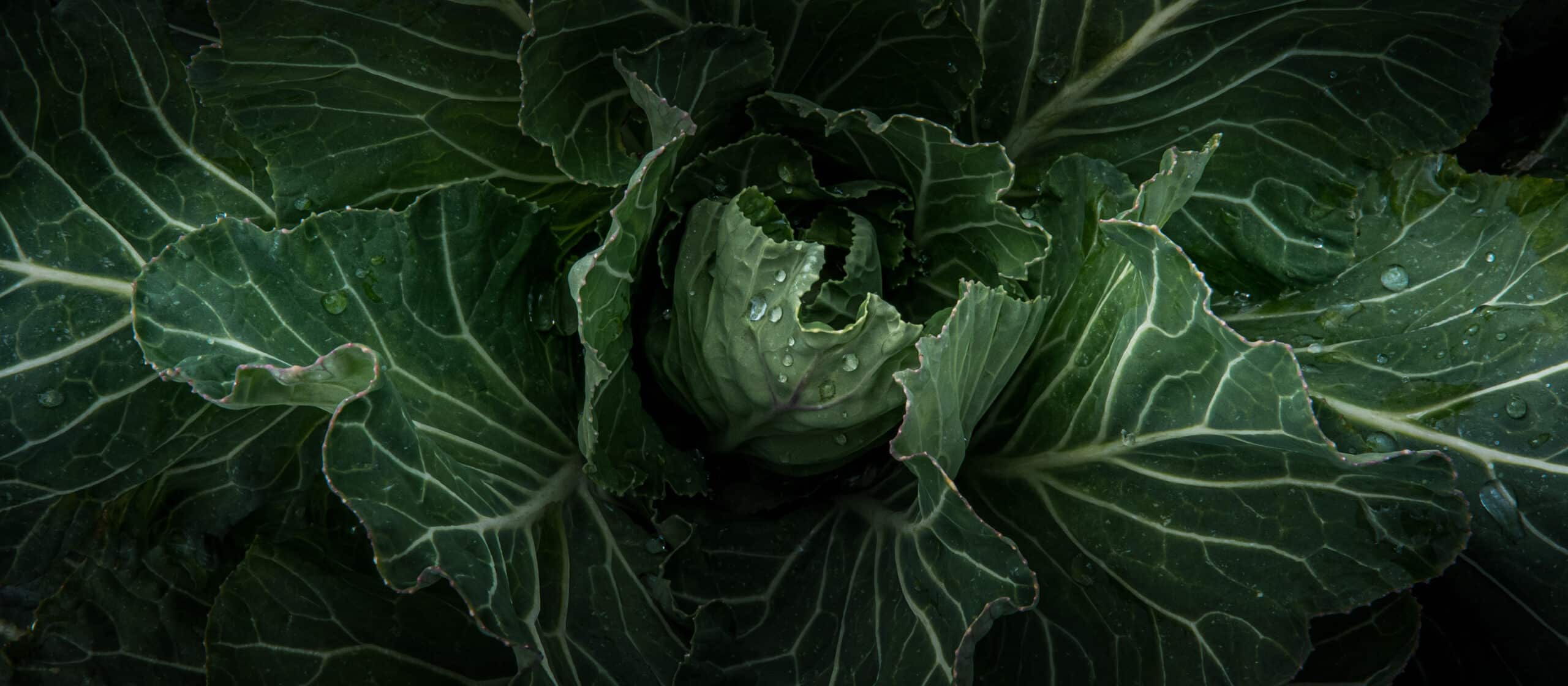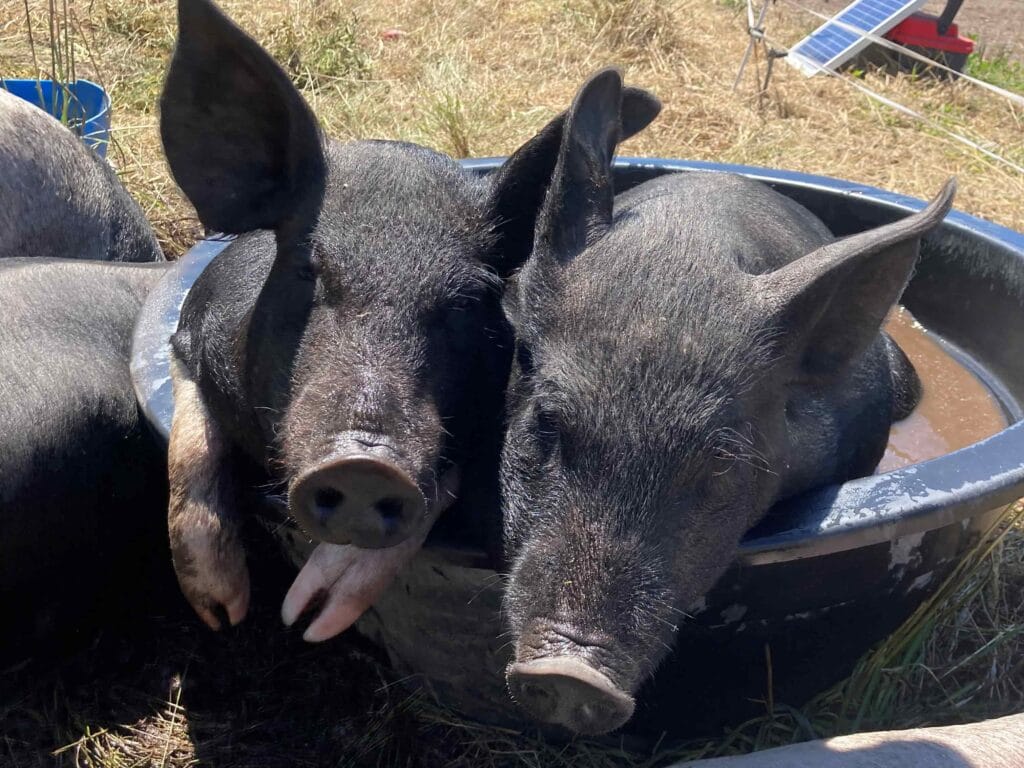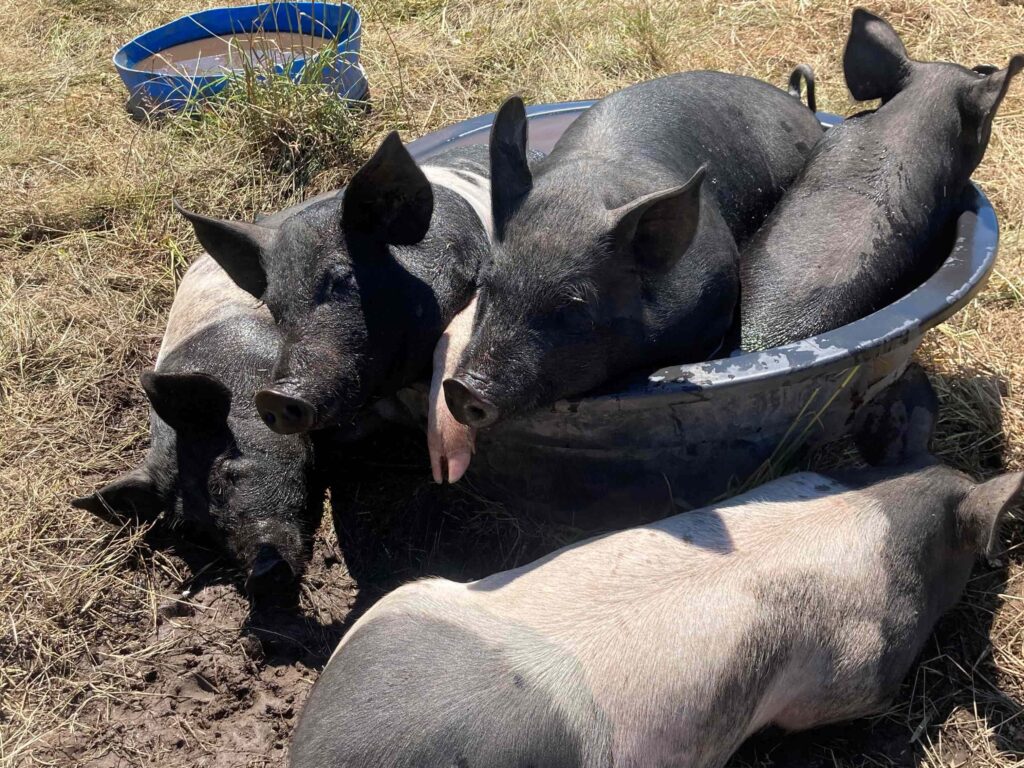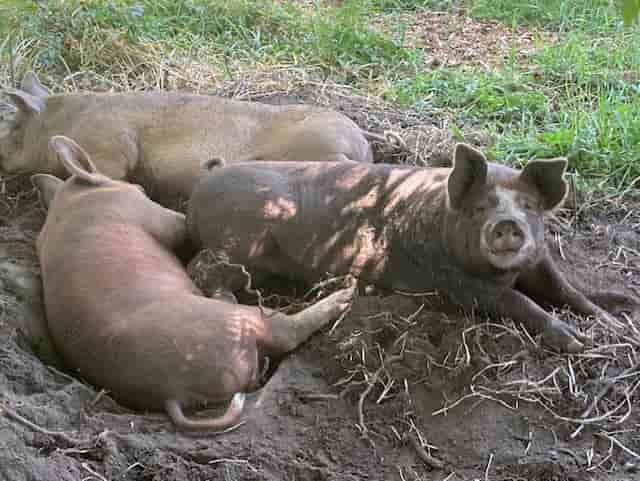
The Farm of the Future: How Small Scale Pastured Pigs Could Solve Shortages and the Environment
The Farm of the Future: How Small Scale Pastured Pigs Could Solve Shortages and the Environment
- posted on: August 28, 2021
- posted by: Rebecca Jordan
"*" indicates required fields


This article was written by Becca Jordan, Operations Manager.
Widespread concerns about meat safety, rampant packing plant closures, and breakdowns in food supply chains since the beginning of the pandemic—and even earlier—leave many consumers frustrated.
But in bright spots around the country, local ranchers and small scale meat farmers are supplying high quality pork and beef free of issues that plague feedlots. The resulting meat not only has a taste that chefs in Seattle covet, but are raised with animal husbandry practices that could help address farm and ecological issues toward climate resilience.
Local hog farmer Masra Clamoungou is addressing our fragile food system by raising ten hogs on the 21 Acres farm.
“As a first-time livestock farmer, it is easy for me to see why raising animals on pasture just makes sense. When I see one of my pigs thrashing the giant branch it just picked up, like an ecstatic dog on the beach, I know all is right in this little corner of our world,” said Clamoungou.
Clamoungou is passionate about small-scale farming and feeding consumers in a time when fully-stocked grocery shelves and food security nationwide are not always guaranteed. He is from the South End of Seattle, and has spent the last six years learning and working in sustainable agriculture. He attended the SAgE program at Seattle Central College, where he met Shawn Miller, a vegetable and hog farmer at Tuk Muk farms in Woodinville. Together, they represent the future of small-scale meat farming that is playing an ever-increasing role in a greater ecosystem.
Meat processing and distribution hurdles during COVID-19

“Processing is a challenge,” said Miller. When his first slaughterhouse in Yelm closed in 2018, it severely limited his distribution options. USDA-certified slaughterhouses can sell to groceries and restaurants, but are few and far between. The next-closest USDA facility at the time was north of Bellingham, making distance a barrier for farmers in the Sammamish and Snohomish Valleys. (Since that time, a partnership between King County and Carnation Farms enabled a new slaughter facility to open more locally.)
Traveling processing trucks posed an obvious solution. Falling River Meats, one such traveling service, processes meat and turns the excess into high-quality pet food, reducing waste and making sure the process is as humane as can be for the pigs on the property where they were raised. Clamoungou used this service for his hogs last year, and plans to do so again this year.
Though traveling facilities like this are not USDA-certified, they are certified instead by Washington State Department of Agriculture (WSDA). While an obvious solution for a lot of local farmers, this certification means that farmers can only distribute meat to individual end-users, and cannot resell thereafter. This means that locally-raised meat processed in this way can’t be found in restaurants or groceries.
COVID-19 has further complicated the issue. In early 2020, Tyson Foods, a multinational meat processor, was forced to shutter multiple locations due to hundreds of cases of coronavirus in workers. Amid these food shortages, high demand and bottlenecks at limited numbers of slaughterhouses make it difficult for small-scale pig farmers such as Tania Issa to harvest pigs on time, at the ideal weight, and get them to consumers.
With local food in high demand, many farmers who normally sell products to restaurants and at farmers markets (some of which closed in Seattle in 2020) have nimbly shifted to sell direct to consumer. Clamoungou says that all the meat cuts he anticipated from his hogs in 2020 sold before harvest, and 2021 shares of the Hampsire/Duroc cross breed he’s raising this year are nearly sold out.
The farm of the future

Clamoungou and Miller are hopeful that more small-scale farmers can help disrupt the current food system which leads to climate impacts, shortages, unhappy animals, and unhealthy food.
Pasture-raising meat animals is better for the animals themselves—and leads to better quality meat.
“When not playing or munching on branches, the pigs spend much of their time engaging in other behaviors like rooting or exploring the pasture features with their noses and mouths,” said Clamoungou. “Because factory-farmed pigs aren’t given access to these natural features, they are often forced to resort to unhealthy behaviors to compensate. Simply put: Pasture raising is better for the pigs’ quality of life.”
Pigs’ natural instincts also pose a solution for farmers dealing with recurring weeds. When combating invasive weeds such as reed canary grass, pigs are a natural solution—an alternative to toxic chemicals and extreme measures. In fact, Miller began raising pigs as a direct solution to weed pressures on his two-acre vegetable farm, Tuk Muk farms, which grows Japanese and other hard-to-find Asian vegetables. Sheep and goats were an alternative, but sheep only graze from the neck down, and goats graze from the neck up. “Pigs do both,” he said.
“They use their snouts in a rooting action, like a shovel,” said Clamoungou. “They do a good job rooting up the rhizome mats of roots.” Once weeds are rooted out, farmers using this method often pair it with cover cropping or solarizing due to the weed seeds resulting from pig manure—what goes in must come out, after all.
Clamoungou’s process is a stark contrast to how most grocery store and restaurant meat is produced. Huge concrete facilities are often packed with animals for processing, endanger workers with the speed of processing lines, and encourage unhealthy animal behaviors. Clamoungou says about the pigs, “Seventy-five percent of their active time is spent foraging for food. That means rooting in the ground and browsing looking for food – quite the opposite of conventional methods that are stressful for animals.”
The viral load is a major concern at large facilities, too, and with the coronavirus at the forefront of everyone’s mind, addressing it is vital. The intense concentration of hogs requires regular treatment for viruses. “On pastured farms, the viral load is small, and we don’t need to keep treating them,” said Miller. “Pasture raising is the antidote to virus problems in big facilities.”
Read more about Clamoungou’s pasture-raised farming project.
Meat and climate change

“Small scale pastured livestock is the direct countering of the systems that cause severe climate change,” said Miller.
To those who have heard that reducing our meat intake is an important step to take toward climate resilience, that might come as somewhat of a surprise.
Although many climate researchers posit that a massive shift to plant-based diets is necessary to address climate challenges, meat remains a staple of the American diet, and meat alternatives aren’t necessarily helping.
Massive monocropping of soy and grains in America’s breadbasket are often grown traditionally, with chemicals that pose a danger to the environment and contribute to biodiversity loss. “Meat alternatives made from soy and grains are just repeating big ag’s problems,” said Clamoungou. “We have whole, good foods—we don’t need an Impossible Burger.”
“The major issue is not meat itself, but the way we currently produce meat,” he added.
To both farmers, it seems only natural that people should have a greater understanding of how their food is being produced, including how animals are raised. “Part of being a human is to steward what we have here,” said Miller.
“We have this vision of a better food system,” said Clamoungou. “Pasture-raising is a low-impact system that feeds the community and addresses climate change at the same time.”
About Becca Jordan
Becca Jordan is our Operations Manager at 21 Acres. Becca connects with visitors and keeps 21 Acres communications running smoothly. She has a variety of background experience, from science fiction writing and art to education, technical theatre, and costume design to horse care. She’s passionate about learning new things about the natural world and social and climate justice. In 2015 Becca participated in the Clarion Writer’s Workshop and graduated with an MFA from California Institute of the Arts in 2016. Becca originally hails from Escondido, California. Her favorite parts of the Pacific Northwest are the ancient trees and the plethora of life around every corner.
About Masra Clamoungou
Masra Clamoungou was born and raised in the South End of Seattle, and has spent the last five years learning about and working in sustainable agriculture. Until recently, he was attending Sterling College in Kentucky pursuing a degree in Sustainable Agriculture. At the moment, he is passionate about pigs.










 back to blog overview
back to blog overview







